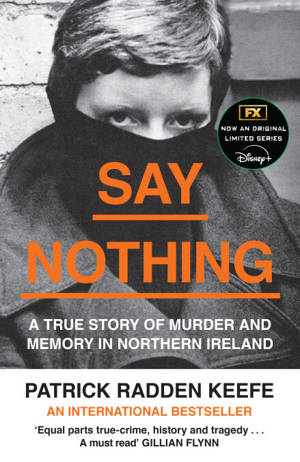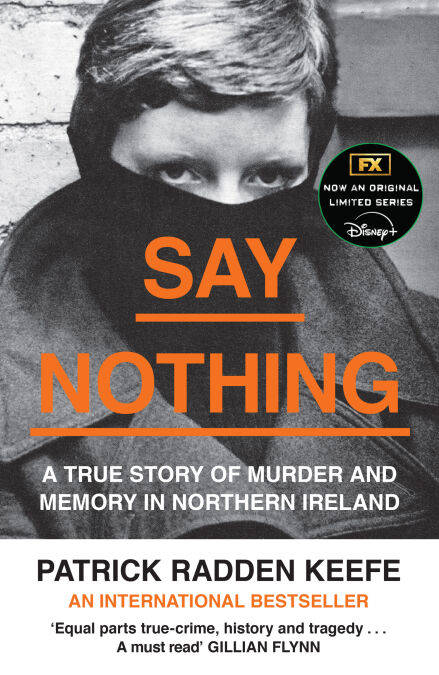
En raison d'une grêve chez bpost, votre commande pourrait être retardée. Vous avez besoin d’un livre rapidement ? Nos magasins vous accueillent à bras ouverts !
- Retrait gratuit dans votre magasin Club
- 7.000.000 titres dans notre catalogue
- Payer en toute sécurité
- Toujours un magasin près de chez vous
En raison de la grêve chez bpost, votre commande pourrait être retardée. Vous avez besoin d’un livre rapidement ? Nos magasins vous accueillent à bras ouverts !
- Retrait gratuit dans votre magasin Club
- 7.000.0000 titres dans notre catalogue
- Payer en toute sécurité
- Toujours un magasin près de chez vous
Say Nothing EBOOK
A True Story Of Murder and Memory In Northern Ireland
Patrick Radden Keefe
Ebook | Anglais
7,79 €
+ 7 points
Format
Description
THE INTERNATIONAL BESTSELLER
A NEW YORK TIMES BEST BOOK OF THE 21ST CENTURY
Now an FX TV series streaming on DISNEY+
'Unquestionably one of the greatest literary achievements of the 21st century' Nick Hornby
From the author of Empire of Pain – a stunning, intricate narrative about a notorious killing in Northern Ireland and its devastating repercussions.
One night in December 1972, Jean McConville, a mother of ten, was abducted from her home in Belfast and never seen alive again. Her disappearance would haunt her orphaned children, the perpetrators of this terrible crime and a whole society in Northern Ireland for decades.
In this powerful, scrupulously reported book, Patrick Radden Keefe offers not just a forensic account of a brutal crime but a vivid portrait of the world in which it happened. The tragedy of an entire country is captured in the spellbinding narrative of a handful of characters, presented in lyrical and unforgettable detail.
A poem by Seamus Heaney inspires the title: ‘Whatever You Say, Say Nothing’. By defying the culture of silence, Keefe illuminates how a close-knit society fractured; how people chose sides in a conflict and turned to violence; and how, when the shooting stopped, some ex-combatants came to look back in horror at the atrocities they had committed, while others continue to advocate violence even today.
Say Nothing deftly weaves the stories of Jean McConville and her family with those of Dolours Price, the first woman to join the IRA as a front-line soldier, who bombed the Old Bailey when barely out of her teens; Gerry Adams, who helped bring an end to the fighting, but denied his own IRA past; Brendan Hughes, a fearsome IRA commander who turned on Adams after the peace process and broke the IRA’s code of silence; and other indelible figures. By capturing the intrigue, the drama and the profound human cost of the Troubles, the book presents a searing chronicle of the lengths that people are willing to go to in pursuit of a political ideal, and the ways in which societies mend – or don’t – in the aftermath of a long and bloody conflict.
A NEW YORK TIMES BEST BOOK OF THE 21ST CENTURY
Now an FX TV series streaming on DISNEY+
'Unquestionably one of the greatest literary achievements of the 21st century' Nick Hornby
From the author of Empire of Pain – a stunning, intricate narrative about a notorious killing in Northern Ireland and its devastating repercussions.
One night in December 1972, Jean McConville, a mother of ten, was abducted from her home in Belfast and never seen alive again. Her disappearance would haunt her orphaned children, the perpetrators of this terrible crime and a whole society in Northern Ireland for decades.
In this powerful, scrupulously reported book, Patrick Radden Keefe offers not just a forensic account of a brutal crime but a vivid portrait of the world in which it happened. The tragedy of an entire country is captured in the spellbinding narrative of a handful of characters, presented in lyrical and unforgettable detail.
A poem by Seamus Heaney inspires the title: ‘Whatever You Say, Say Nothing’. By defying the culture of silence, Keefe illuminates how a close-knit society fractured; how people chose sides in a conflict and turned to violence; and how, when the shooting stopped, some ex-combatants came to look back in horror at the atrocities they had committed, while others continue to advocate violence even today.
Say Nothing deftly weaves the stories of Jean McConville and her family with those of Dolours Price, the first woman to join the IRA as a front-line soldier, who bombed the Old Bailey when barely out of her teens; Gerry Adams, who helped bring an end to the fighting, but denied his own IRA past; Brendan Hughes, a fearsome IRA commander who turned on Adams after the peace process and broke the IRA’s code of silence; and other indelible figures. By capturing the intrigue, the drama and the profound human cost of the Troubles, the book presents a searing chronicle of the lengths that people are willing to go to in pursuit of a political ideal, and the ways in which societies mend – or don’t – in the aftermath of a long and bloody conflict.
Spécifications
Parties prenantes
- Auteur(s) :
- Editeur:
Contenu
- Nombre de pages :
- 528
- Langue:
- Anglais
Caractéristiques
- EAN:
- 9780008159276
- Date de parution :
- 31-10-18
- Format:
- Ebook
- Protection digitale:
- Adobe DRM
- Format numérique:
- ePub

Les avis
Nous publions uniquement les avis qui respectent les conditions requises. Consultez nos conditions pour les avis.






